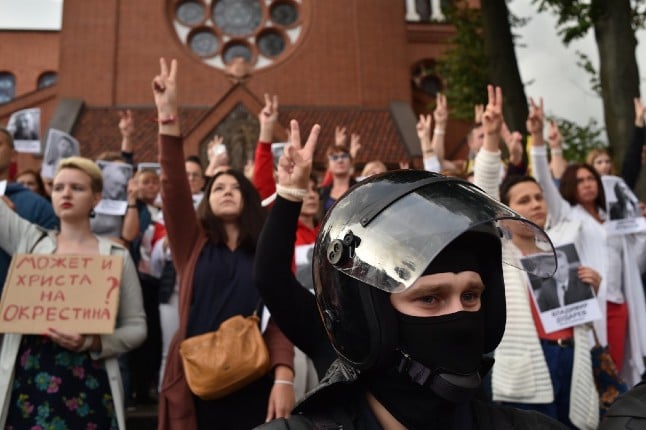“They’re feeling fairly well, considering the circumstances,” ambassador Jens Odlander told news agency TT.
The journalists Martin Schibbye, 30, and freelance photographer Johan Persson, 29, also managed to contact relatives in Sweden by telephone, on Monday. The Swedes have minor bullet injuries, and are currently in the city Jijiga, close to the Somali border.
“We’re in a very sensitive position right now. The only thing I can confirm is that I’ve met them and that they feel, considering the circumstances, alright,” said Odlander.
Both Swedes have now received medical attention for their injuries.
“They’re physically and mentally exhausted, and feel strained by the situation. They’ve received medical attention in jail, and they were given first aid in connection with their arrest,” said Cecilia Julin from the Foreign Ministry’s press office.
According to the Foreign Ministry, a judicial process has commenced, and it was first believed that the Swedes would face Ethiopian court on Tuesday.
“We’ve received information that court proceedings will begin, but it’s still unclear what they’re being accused of,” said Julin.
But later on Tuesday morning the foreign ministry said that the information they had received regarding the Swedes trial was uncertain. According to TT, the ministry is expecting another report from ambassador Odlander in Addis Ababa.
The two Swedish journalists were in a conflicted area, the region Ogaden by the Somali border, when they were arrested.
Ogaden is closed to journalists, and there is an armed conflict going on between the government army and the rebel movement Ogaden National Liberation Front (ONLF).
Ogaden is populated by ethnic Somalis, and the Swedes entered the area together with rebels from Somali breakaway republic Puntland, in order to report on the situation.
Abdi Mahdi, who heads of the UK branch of the ONLF organization in London told TT on Sunday evening that he had been in contact with the reporters three days ago.
“I spoke to them when they were on their way into Ogaden, and we provided them with guides and directions. The plan was for them to tour the whole area but when we didn’t hear from them we began to worry,” Mahdi told TT.
Later on Sunday night it was confirmed by Ethiopian authorities that Ethiopian soldiers had killed 15 ONLF rebels in the Ogaden region.
Schibbye and Persson, who accompanied them, were reported to have sustained minor injuries in the clash between guerrilla and government forces.
“15 rebels, all armed, were killed and six were injured. Two Swedish reporters sustained minor injuries during the fighting,” Shimelis Kemal, spokesman for the Ethiopian government told news agency Reuters on Sunday.
Peter Wallensteen, professor of peace and conflict research at Uppsala University, describes Ethiopia as a country full of war and conflict.
“I’ve seen some prisons where you don’t want to end up. There’s several ongoing wars, and it’s not a country governed by law. Ethiopia’s way down on the democracy scale,” said Wallensteen.
According to Wallensteen, Sweden has a good relationship with Ethiopia, a major beneficiary.
“Hopefully there will be no more than a formal court case, and then they’ll be released,” he said.
ONLF was formed in 1984, and are usually described as un-uniformed forces, with close ties to the area’s nomadic peoples.
The guerilla’s demands have varied between full independence, connection to a “Greater Somalia” (encompassing Somalia, Djibouti, the Ogaden of Ethiopia and the North Eastern Province of Kenya) and greater autonomy under Ethiopia.
Ethiopia accuses ONLF of being terrorists and claim they are supported by arch-enemy Eritrea.
Reporters without Borders thinks that the Swedish government have been too restrained and demand that the authorities in Addis Ababa must be made to clarify the circumstances of the Swedes’ arrest as well as provide information about their current status.
“We must insist that journalists cannot be treated as rebels just because they were covering rebel activity,” they said in a statement.
“We urge the Ethiopian government to guarantee access to the Ogaden for journalists and human rights activists. The news blackout that has been imposed on what is taking place in this region is outrageous. It forces journalists to enter the region illegally and just fuels suspicion that terrible human rights violations are taking place there,” the organisation wrote.
Chairman of the Swedish branch of the organisation, Jesper Bengtsson, thinks that the foreign ministry is doing a good job in helping the captured Swedes.
But the government is too restrained in their statements in what is ultimately a political question, Bengtsson told TT.
“When two journalists are held captive in a foreign country because they have tried to report on possible human rights abuse, the government should speak up and demand their release. I find it very hard to understand why this is treated like any consular matter,” Bengtsson told TT.
According to Bengtsson the Swedes chances will not change for the worse if the government aims public criticism against Ethiopia.
“I can’t see how that would be held against the reporters,” he said.


 Please whitelist us to continue reading.
Please whitelist us to continue reading.
Member comments